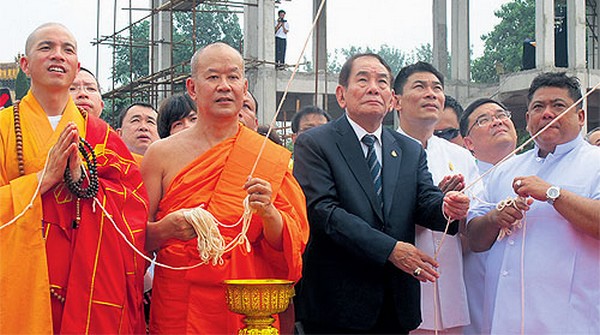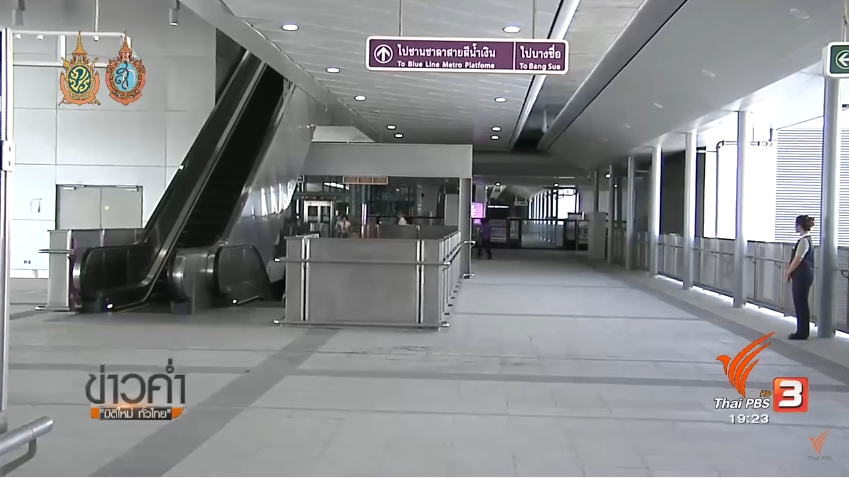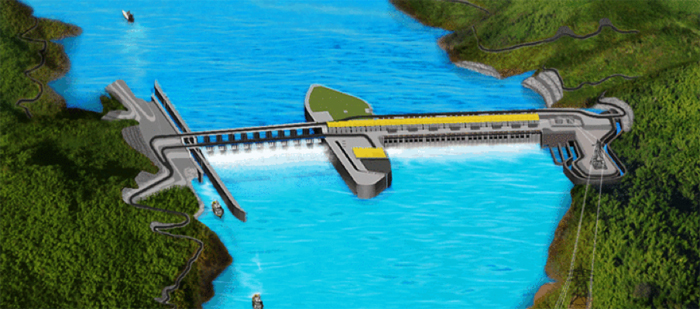On Friday, the Supreme Administrative Court handed down a devastating ruling that forces the Pollution Control Department to pay more than 9 billion baht to a private consortium known as the NVPSKG which was contracted to build the Klong Dan waste water treatment facility in tambon Klong Dan, Bang Bo district of Samut Prakan.
The court’s verdict — which upholds an earlier ruling by an arbitrary committee and the Administrative Court — marks the latest damning phase of this shameful and corruption-plagued project which was once branded the “Mother of all corruption cases”. (The infamous title has since been handed to the Yingluck Shinawatra government’s rice-pledging scheme.)

Vatana Assavahame, third from left, was convicted for bribery and sentenced to 10 years in prison. He showed no remorse, and fled the country, showing up at a Buddhist temple China in a December, 2012, photo op. (Photo by Nauvarat Suksamran)
The Klong Dan waste water treatment project provides a worthy study case for students learning how insidious and highly refined corruption is and how it works so that they learn all of the pitfalls and, hopefully, help in the fight against it.
This is a classic corruption case. It involves all of the trickery and chicanery that any crook could imagine and put into practice for the sole purpose of cheating the state and the taxpayer — no shame, no social responsibility, no conscience.
The Klong Dan case — like many other corruption cases, including the rice-pledging scheme — stands as a testament to the reality that corruption laws must be amended to make any graft charges exempted from the restrictions of the statute of limitations. Corrupt politicians and officials who flee from the country to seek a safe haven abroad must be put on trial when they return home, no matter how long they stay abroad.
Many readers, expatriates and locals, may have forgotten about the case or have scant memories of it — which is not surprising because it happened almost 20 years ago when the project was endorsed in 1995 by the Democrat-led government of prime minister Chuan Leekpai.
The following is some key background information that I would like to share with readers so that they can keep abreast of the case, know who the key players are and understand why the Klong Dan project is such a big disgrace to all of us, especially the people in Samut Prakan.
Three ministers were involved in the project — Suwat Liptapallop, then the science minister, Vatana Asavahame, then deputy interior minister, and Yingphan Manasikarn, then minister of natural resources and environment, who has already passed away.
The winning contractor was a consortium known as NVPSKG, which was made up of the following companies: Vichitphan Construction, which is owned by the Chavananand family; Seesaeng Karn Yotha, whose founder is Banharn Silpa-archa, the former prime minister who is now chief adviser to the Chartthaipattana party; Krung Thon Engineering, which is affiliated with Vichitphan; and Prayoonvisavat Karn Chang, which was founded by Visava Liptapallop, father of Mr Suwat.
These companies all have political connections and that is why they were awarded the contract.
The project was proposed to Mr Chuan’s cabinet in 1995 by then science minister Suwat and was eventually approved. But the contract was signed by minister Yingphan Manasikarn in 1997 with the NVPSKG consortium.
The people in Samut Prakan, especially those in Bang Bo district who were to be directly affected by the project, learned about it only two years after — and it was then that protests started. Yet the project continued as the protests continued and occasionally turned violent.
In 2003, the protesters won the fight when then natural resources and environment minister Praphat Panyachartrak of the Thaksin I government ordered the suspension of construction and set up a fact-finding committee to investigate the project. The probe confirmed rampant corruption and the case was forwarded to the National Anti-Corruption Commission, focusing on the land acquisition by Vatana.
Initially, the project site was located in Samut Chedi and Phra Pradaeng districts. The waste water treatment facility was divided into two sections — one on the western side to accommodate waste from Samut Chedi, Phra Pradaeng and Suksawat Road, and the other on the eastern side to accommodate waste from Muang, Phra Pradaeng, Bang Pu and Bang Phli districts. The construction cost was estimated at 13.6 billlion baht, to be funded by a state budget, the Environment Fund and an Asian Development Bank loan.
Somehow, the PCD, probably influenced by politicians, changed the construction plan by shifting the site to Bang Bo district, changed the pipeline network from above ground to underground and decided to dump treated water directly into the sea. The cost of the turnkey project ballooned to 23.7 billion baht.
Why was the construction site shifted to Bang Bo district? This was the main focus of the NACC’s probe, and it resulted in Vatana being sentenced to 10 years in prison by the Supreme Court’s criminal division for political office holders. Vatana fled the country before the court announced the verdict and is still abroad.
The NACC detailed some of the tricks used to acquire 1,900 rai of land for the project which was later sold to the PCD. Villagers in tambon Klon Dan in Bang Bo were told to sell their land by brokers — at cheap prices of course. Those who failed to obey would find their properties completely blocked off by other people’s.
In other cases, duplicate land rights documents were issued with the help of corrupt land officials for the same land plots owned by those who refused to sell, causing legal disputes that ended badly for the real owners.
Also, with the help of reluctant land officials, land title deeds were issued for public land, roads and khlongs. Special survey devices were bought, with state funds of course, to speed up land measurement in swamps so that land title deeds could be issued and legally sold to the PCD. For this process, several land officials in Samut Prakan were recruited to help to upgrade the land rights papers — namely Sor Kor 1 and Nor Sor 3 — into title deeds.
For the illegal services rendered to Vatana, two land officials were awarded a gold-plated Pong Suphan amulet each. I have no idea whether the Pong Suphan amulet was real or not.
Before the contract was signed in 1997, attempts were made to acquire a new land plot for the project. Front companies were set up for this purpose. First, the Muang Rai Lan Thong Company bought land from villagers at about 20,000 baht a rai. Then the land was sold to Palm Beach Development Company whose directors included a member of the Asavahame clan at 100,000 baht a rai. The land was then sold to Klong Dan Marine and Fishery for approximately 260,000 baht a rai.
No money was actually paid in these land transactions because the companies were all affiliated. The PCD bought 1,900 rai of land at about one million baht per rai. So you can see the ripoff.
About 14 billion baht has already been paid to the consortium with the rest to be paid as ordered by the court. A special budget will have to be allocated anyway. But, in the end, it is the taxpayers who will foot the bill.
So, what to do with the waste treatment facility which is almost complete? Experts point out the facility was designed to treat organic waste and not heavy metals which are the main threat from industrial waste. Also, activating the facility may spark off protests.
So, the likelihood is that the 9 billion baht is another payment we will have to shoulder in this corruption-plagued project. The Klong Dan waste treatment plant, like the Hopewell elevated railway project, will be abandoned and left as a testament of shame for us.
But the tragedy of this disgraceful corruption case is not just the wasteful spending of taxpayer money but the fact that we have not learned any lessons and we keep electing these crooks back into the parliament.
Source: http://www.bangkokpost.com/opinion/opinion/445034/klong-dan-the-mother-of-corruption-cases

